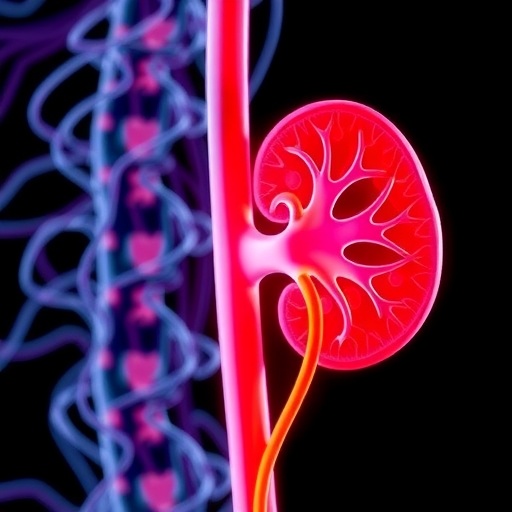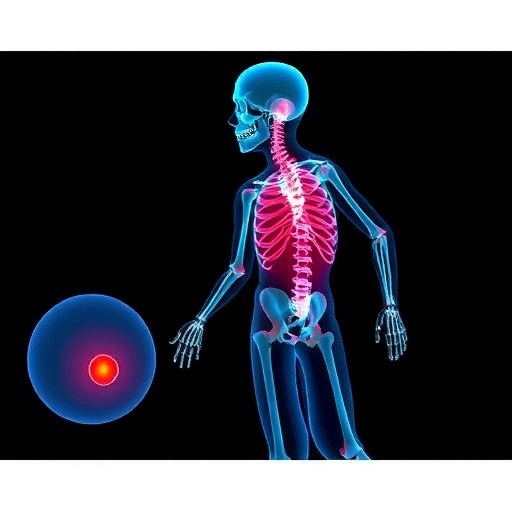
In a groundbreaking study published in the journal “Diabetes Therapy,” a research team led by Sun et al. delves into the significant relationship between insulin resistance and the development of diabetic kidney disease (DKD) in individuals with type 2 diabetes mellitus (T2DM). This research provides compelling insights into how insulin resistance surrogates can serve as predictive tools for assessing the risk of DKD, which is a common and serious complication of diabetes. As the prevalence of T2DM and its associated complications continues to rise worldwide, understanding these relationships is critical for the development of effective preventative and therapeutic strategies.
Diabetic kidney disease is characterized by a gradual decline in kidney function, leading to end-stage renal disease, requiring dialysis or transplantation. It is recognized as a major public health challenge, affecting millions of people globally. The underlying mechanisms of DKD are complex, involving a combination of metabolic disturbances, hemodynamic changes, and inflammatory processes. The interplay of these factors leads to renal glomerulosclerosis and nephron loss, ultimately resulting in kidney dysfunction. This research emphasizes the need for early detection and intervention, as traditional methods of monitoring kidney health may not fully capture the nuances of metabolic derangements present in diabetic patients.
One of the main findings of this study is that insulin resistance surrogates, which can be assessed with relative ease in clinical settings, may provide valuable insights into the risk of DKD. The research focuses on several commonly used indicators of insulin resistance, such as the homeostasis model assessment of insulin resistance (HOMA-IR) and the quantitative insulin sensitivity check index (QUICKI). These metrics can be derived from routine laboratory tests, making them accessible for widespread clinical use. The study posits that implementing these simpler measures could lead to earlier identification of patients at high risk for developing DKD.
Furthermore, the study explores the broader implications of insulin resistance on cardiovascular health and its potential to exacerbate kidney conditions. Impaired insulin signaling may not only affect glucose metabolism but also contribute to vascular dysfunction, which is heavily implicated in the progression of DKD. The research emphasizes that mitochondria, often referred to as the powerhouses of the cell, play a significant role in these metabolic pathways. Understanding how insulin resistance impacts mitochondrial function could be key to developing targeted interventions that address both kidney and cardiovascular health.
The researchers employed a robust methodological framework, conducting a comprehensive analysis of a cohort composed of individuals diagnosed with T2DM. Using cross-sectional and longitudinal data, they were able to assess the changes in kidney function over time while correlating these changes with various insulin resistance markers. This nuanced approach allowed for a clearer understanding of how early metabolic disturbances could predict later outcomes in kidney health.
Data interpretation highlighted that even slight increases in insulin resistance, as indicated by the selected surrogates, correlated significantly with deterioration in kidney function. This finding underscores the potential of these surrogates as early warning indicators of DKD, providing an impetus for clinicians to monitor insulin sensitivity in their diabetic patients rigorously. The research advocates for a paradigm shift in how diabetes management is approached, suggesting that integrating metabolic assessments could enhance patient outcomes.
Another critical aspect touched upon in this study is the influence of lifestyle factors, including diet and physical activity, on insulin sensitivity and subsequent kidney health. The research emphasizes that interventions aimed at improving insulin sensitivity through lifestyle changes could have far-reaching benefits, not just for metabolic health but also for renal function. This highlights the integrated nature of treating T2DM, where a comprehensive approach that considers both dietary and physical activity patterns may be essential in mitigating the risks of DKD.
Moreover, the research provides insight into potential therapeutic avenues that could be explored alongside insulin resistance management. Novel pharmacological agents targeting metabolic pathways associated with insulin action may hold promise for reducing the risk of DKD. The role of emerging diabetes medications and their effects on kidney outcomes, particularly in patients with existing insulin resistance, is a critical field of ongoing research.
This study is critical in emphasizing the importance of addressing insulin resistance comprehensively, not just as a marker but as a modifiable risk factor in diabetes management. Future studies should further investigate the mechanistic pathways linking insulin resistance to kidney pathology. A deeper understanding of these relationships could pave the way for developing novel strategies aimed at prevention and treatment, ultimately enhancing the quality of life for patients with T2DM.
As healthcare continues to evolve towards precision medicine, insights like those provided in this study will be pivotal. It allows clinicians to use predictive metrics that not only help in the identification of at-risk patients but also tailor interventions that could prevent the progression of diabetic complications. Robust screening protocols and educational initiatives targeting both healthcare providers and patients will be vital to harness the findings of this research effectively.
In summary, the research by Sun et al. provides significant contributions to our understanding of the predictive power of insulin resistance surrogates concerning the development of diabetic kidney disease in type 2 diabetes mellitus. By substantiating the link between metabolic health and kidney function, the study encourages a reevaluation of current standard practices in diabetes management. With rising diabetes prevalence, the implementation of these findings could play a crucial role in alleviating the burden of diabetic complications on healthcare systems.
Given the pressing need for effective diabetes management strategies, studies such as this are essential not only for advancing scientific knowledge but also for influencing clinical practices that could lead to better patient outcomes. This research highlights the urgent need for further exploration of insulin resistance in relation to chronic diabetes complications, adhering to a growing body of evidence that underscores the importance of early intervention and comprehensive care.
Subject of Research: Predictive value of insulin resistance surrogates for diabetic kidney disease in type 2 diabetes mellitus.
Article Title: The Predictive Value of Insulin Resistance Surrogates for Diabetic Kidney Disease in Type 2 Diabetes Mellitus.
Article References:
Sun, Q., Zhao, M., Wang, X. et al. The Predictive Value of Insulin Resistance Surrogates for Diabetic Kidney Disease in Type 2 Diabetes Mellitus.
Diabetes Ther 16, 1649–1663 (2025). https://doi.org/10.1007/s13300-025-01765-0
Image Credits: AI Generated
DOI: https://doi.org/10.1007/s13300-025-01765-0
Keywords: insulin resistance, diabetic kidney disease, type 2 diabetes mellitus, metabolic health, predictive metrics.
Tags: diabetic kidney disease risk assessmentearly detection of kidney dysfunctionhemodynamic changes in diabetic patientsinflammatory processes in kidney diseaseinsulin resistance indicatorsmetabolic disturbances in diabetesmonitoring kidney health in diabetespredictive tools for DKDpublic health challenges of diabetesrenal glomerulosclerosis mechanismstherapeutic strategies for DKDtype 2 diabetes complications




